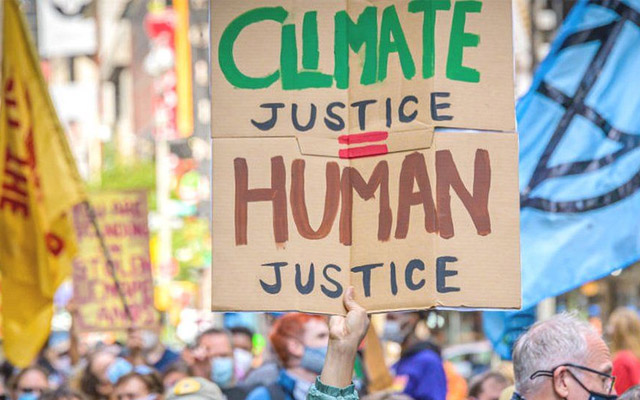
For a Socially Just, Ecologically Sound Local Economy that Works for Everyone.
Building Bridges, a program of DCI established in 2011, grew from a community gathering of 120 leaders, educators and activists in Ithaca, with the goal of bridging those of us who were dedicated to social justice, and those of us who were dedicated to sustainability and climate change. These two strains of activism were robust and committed, yet were seldom seeing the interconnected impacts of the systems and policies, goals and behaviors we were working on and joining forces in collaborative ways for collective impact.
Building Bridges participants met in large and small work groups, organized around particular areas of their passions, and then came together to draw their visions of a community working in solidarity for our mutual health, safety, thriving, and connection.
We distilled those drawings into our Vision: “Building Bridges envisions a socially just, ecologically sound local economy that works for everyone.”
We also articulated 4 Building Bridges Principles that our membership was asked to commit to using in their organizational plans and strategies:
PRINCIPLE 1
Put equity and environment at the center of all we do.
PRINCIPLE 2
Respect human rights and human dignity.
PRINCIPLE 3
Build stronger, healthier relationships across race, class, place, gender identity, sexual orientation, age, etc.
PRINCIPLE 4
Ensure broad inclusion and access to decisions about available resources.
We formed a planning group and organized to offer several workshops and gatherings, and took a deep dive into collective impact as a powerful strategy for multiple sectors, multiple perspectives and diverse experiences to work together to solve big problems through the lens of systemic change. We had groups concentrating on Re-entry and reducing recidivism, Kindergarten Readiness, College and Career, Early Childhood Nutrition, Hospitality Employment Training, and others.On June 5th, 2019, the City of Ithaca Common Council unanimously adopted the Ithaca Green New Deal resolution, a government-led commitment to community-wide carbon neutrality by 2030 that focuses on addressing historical inequities, economic inequality, and social justice. Two years after the resolution was signed, Ithaca established itself as a world-leader in climate mitigation planning and continues to pave the path forward as a blueprint for other cities across the U.S. and the globe.
To achieve environmental sustainability, transitioning to renewable energy, Ithaca committed to accomplish that through opportunities and guidelines to ensure that low-middle income people and marginalized communities who are most vulnerable to the impacts of climate change would be centered in all new initiatives to achieve carbon neutrality by 2030. The IGND necessitates community engagement and timely information.
Ithaca has fallen behind its Green New Deal goal of carbon neutrality by 2030, but there have been many strides and accomplishments. The commitment to include and center “climate justice households” continues to inform how green job opportunities and training, transportation, retrofitting houses to renewable energy and appliances, energy conservation and electrification, and access to affordable fresh, local foods, prioritizes the neighborhoods and households that are too often left out of opportunities.
To that end, Building Bridges formed a Community Engagement Committee and designed information resources and engaged trusted community members to facilitate conversations about the IGND and brainstorm how it might benefit them. These conversations generated a great deal of data that was interpreted and compiled into a report to the new Sustainability Office at the City of Ithaca. One of our members is now the Director of Sustainability, Rebecca Evans.Our planning group also designed a survey of our members to see whether and how well they are using the Four Building Bridges Values in their organizations, and whether an refresher would help. We designed a workshop called Walking the Talk-Putting the Building Bridges Principles into Action to review the principles and generate lots of examples of how the principles can inform the objectives in a workplan. We are happy to offer and customize that workshop for any organization or group.
Building Bridges planners have partnered with a number of organizations and working groups that embrace and express the vision and the principles, and we see ourselves as a network of networks. In 2011, the connection between social justice and sustainability activists was very weak. Today, the perspectives of Intersectional Sustainability and Climate Justice are powerful and international, and most young activists are very clear that we cannot save the planet and without hearing the voices and addressing the impacts on the people who are hurt first and hurt worst by pandemics, climate catastrophes, and are seldom most responsible for the practices and conditions that are at cause. There is no social justice without a clean, healthy environment, and there is no sustainability if people and species are seen as expendable and disposable.